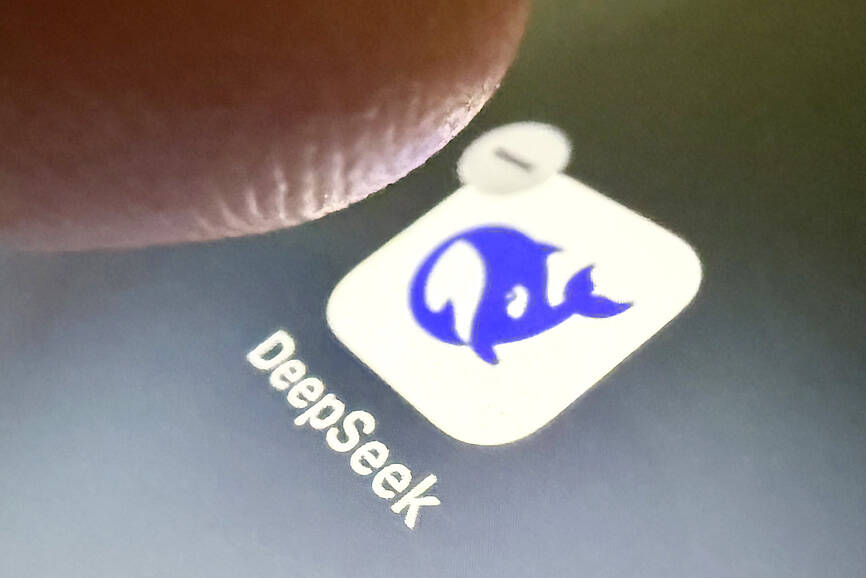The necessity of implementing restrictions against DeepSeek is pending further observations and would only be necessary if the software is transmitting the personal information of Taiwanese to Tencent servers or platforms run by ByteDance, the National Institute of Cyber Security said yesterday.
The artificial intelligence (AI) software has been considered a prime competitor to OpenAI.
Local media yesterday asked whether the agency’s Feb. 20 warning against using DeepSeek would be implemented first by government agencies and then expanded into a general ban.

Photo: CNA
Institute Vice President Kung Hua-chung (龔化中) said the agency used 500 counts of self-developed AI jailbreak prompts against DeepSeek as a test, finding that the software was especially prone to three types of attacks.
Generally speaking, DeepSeek lacks security compared with other AI models, especially regarding on-premises defense, Kung said.
The agency conducted tests on DeepSeek’s iOS and Android applications last month and found both versions connected to Tencent’s China-based servers and ByteDance cloud platforms, Kung said.
The agency is uncertain whether the servers the tests connected to are the same as those in tests conducted in South Korea, Kung said, adding that the agency could not tell what kind of information was being sent back due to encryption.
The information is likely for marketing purposes, he said.
Minister of Digital Affairs Huang Yen-nun (黃彥男) said the Executive Yuan has banned the use of DeepSeek in all government agencies.
Extending the ban to the private sector would depend on whether the software contravenes the Personal Data Protection Act (個人資料保護法), Huang said.
There is not enough evidence of such contravention, and further observation is required, Huang said.
The Ministry of Digital Affairs would continue to work with national security agencies and the Executive Yuan’s Preparatory Office for the Personal Data Protection Committee on the issue, Huang said.

STAY AWAY: An official said people should avoid disturbing snakes, as most do not actively attack humans, but would react defensively if threatened Taitung County authorities yesterday urged the public to stay vigilant and avoid disturbing snakes in the wild, following five reported snakebite cases in the county so far this year. Taitung County Fire Department secretary Lin Chien-cheng (林建誠) said two of the cases were in Donghe Township (東河) and involved the Taiwan habus, one person was bit by a Chinese pit viper near the South Link Railway and the remaining two were caused by unidentified snakes. He advised residents near fields to be cautious of snakes hiding in shady indoor areas, especially when entering or leaving their homes at night. In case of a

A magnitude 6.4 earthquake struck off the coast of Hualien County in eastern Taiwan at 7pm yesterday, the Central Weather Administration (CWA) said. The epicenter of the temblor was at sea, about 69.9km south of Hualien County Hall, at a depth of 30.9km, it said. There were no immediate reports of damage resulting from the quake. The earthquake’s intensity, which gauges the actual effect of a temblor, was highest in Taitung County’s Changbin Township (長濱), where it measured 5 on Taiwan’s seven-tier intensity scale. The quake also measured an intensity of 4 in Hualien, Nantou, Chiayi, Yunlin, Changhua and Miaoli counties, as well as

Credit departments of farmers’ and fishers’ associations blocked a total of more than NT$180 million (US$6.01 million) from being lost to scams last year, National Police Agency (NPA) data showed. The Agricultural Finance Agency (AFA) said last week that staff of farmers’ and fishers’ associations’ credit departments are required to implement fraud prevention measures when they serve clients at the counter. They would ask clients about personal financial management activities whenever they suspect there might be a fraud situation, and would immediately report the incident to local authorities, which would send police officers to the site to help, it said. NPA data showed

ENERGY RESILIENCE: Although Alaska is open for investments, Taiwan is sourcing its gas from the Middle East, and the sea routes carry risks, Ho Cheng-hui said US government officials’ high-profile reception of a Taiwanese representative at the Alaska Sustainable Energy Conference indicated the emergence of an Indo-Pacific energy resilience alliance, an academic said. Presidential Office Secretary-General Pan Men-an (潘孟安) attended the conference in Alaska on Thursday last week at the invitation of the US government. Pan visited oil and gas facilities with senior US officials, including US Secretary of the Interior Doug Burgum, US Secretary of Energy Chris Wright, Alaska Governor Mike Dunleavy and US Senator Daniel Sullivan. Pan attending the conference on behalf of President William Lai (賴清德) shows a significant elevation in diplomatic representation,